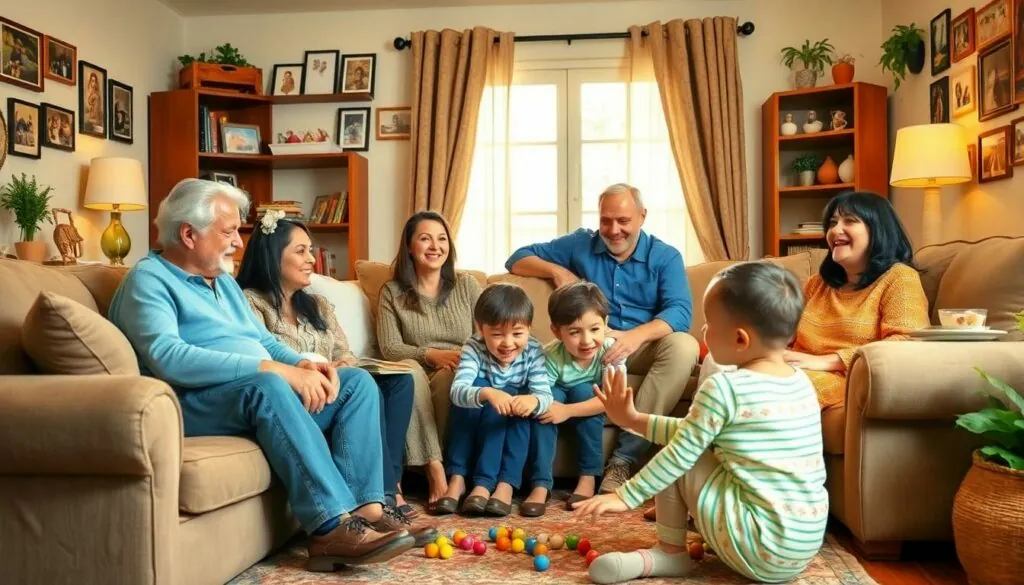Table of Contents
ToggleIn the great debate of family dynamics, the nuclear family and extended family stand as two heavyweight contenders. Picture this: a cozy household of four, where everyone knows the Wi-Fi password, versus a bustling clan where cousins, grandparents, and maybe even that quirky uncle gather for every holiday. Which one truly reigns supreme?
Overview of Family Structures
Family structures vary widely across cultures and societies. A nuclear family typically consists of two parents and their children. This compact unit often emphasizes closeness and direct involvement in children’s upbringing. Therefore, emotional bonds within a nuclear family can be strong.
In contrast, an extended family includes a larger network of relatives, such as grandparents, aunts, uncles, and cousins. This broader configuration fosters a sense of belonging and support. Extended families often share responsibilities and resources, which can enhance stability.
Both structures offer unique advantages. The nuclear family provides privacy and independence, which can aid in personal development. Meanwhile, the extended family offers a diverse support system that can alleviate stress during challenging times. For example, childcare responsibilities might be shared among more family members, allowing parents to maintain their careers.
Studies show that family dynamics influence individual well-being and societal integration. Nuclear families often provide focused environments, while extended families can enhance social connections. Various researchers indicate that cooperation and teamwork flourish in extended family settings.
Adaptability characterizes both structures. Nuclear families can easily relocate for job opportunities, whereas extended families may retain community ties. This flexibility can affect lifestyle choices and educational opportunities for children.
Understanding these differences highlights the need for context in evaluating family structures. Each family type contributes to individual and collective identities within society. Exploring these distinctions reveals the complexity of familial relationships and their impacts.
Nuclear Family Defined

A nuclear family consists of two parents and their children living together. This structure emphasizes unit cohesion, fostering close relationships among immediate family members.
Characteristics of Nuclear Families
Nuclear families typically reside in a single household, promoting a focused family environment. Parents share responsibilities for child-rearing, ensuring consistent support and guidance. Independence often marks these families, allowing members to develop personal identities. Privacy tends to be significant, creating spaces for individual growth. Communication between members frequently prioritizes emotional connection, enhancing bonds that can lead to stronger sibling relationships. Flexibility exists as parents adapt to changing circumstances, such as career shifts or relocating for work.
Advantages of Nuclear Families
Nuclear families offer multiple benefits that contribute to child development. Emotional closeness fosters secure attachments, promoting a sense of belonging among children. Parents typically engage directly in their children’s education, providing tailored support that can enhance learning outcomes. Financial management often becomes streamlined, as fewer individuals share resources. Privacy creates a conducive environment for family discussions and decision-making. Reduced external influences can lead to fewer conflicts within the household. Additionally, the agility of a nuclear family allows for adaptability in challenging situations, facilitating quicker responses to life changes.
Extended Family Defined
Extended families encompass a broader network of relatives beyond the immediate household, including grandparents, aunts, uncles, and cousins. This family structure often fosters a sense of community and belonging, essential for emotional support.
Characteristics of Extended Families
Extended families typically live together or maintain close geographical proximity. Different generations often share living spaces, which fosters interdependence and daily interaction. Close relationships among family members lead to shared responsibilities, allowing caregiving tasks and household duties to be distributed. Emotional support consistently arises from these connections, creating a nurturing environment for both children and elders. Communication patterns usually reflect openness, as family members regularly engage in discussions, fostering a cooperative spirit.
Advantages of Extended Families
Extended families provide a robust support system, especially during challenging life events. By pooling resources, families enhance financial stability and reduce individual burdens. Emotional well-being benefits significantly, since individuals find reassurance in shared experiences and collective problem-solving. The presence of diverse perspectives often aids in child-rearing, as multiple adults contribute to a child’s development. Furthermore, cultural traditions and values are preserved and transmitted through generations, enriching family identity and community ties.
Cultural Perspectives on Family Structures
Cultural viewpoints significantly shape family structures, influencing how nuclear and extended families function. Various cultures prioritize different familial arrangements, reflecting unique values and social norms.
Variations Across Cultures
Countries exhibit diverse family configurations. In collectivist societies, like those in Asia and Africa, extended families often dominate, emphasizing community support and shared responsibilities. Nuclear families, however, tend to be more prevalent in Western cultures, where independence and privacy hold greater importance. Differences also emerge in family roles; some cultures maintain traditional roles for parents and children, while others promote egalitarian approaches. These variations impact expectations of emotional support and involvement in upbringing.
Impacts on Family Dynamics
Family dynamics shift based on cultural structure. Nuclear families typically foster close emotional bonds, enabling direct interaction and involvement in children’s lives. This setting promotes independence, allowing individual development. Alternatively, extended families enhance collective problem-solving and provide robust emotional support networks. The presence of multiple generations fosters continuity of traditions and shared wisdom, leading to richer family experiences. Motivations for cooperation and shared responsibilities arise within these diverse environments, ultimately influencing communication patterns and emotional well-being.
Challenges of Nuclear Families
Nuclear families often face multiple challenges that can impact their dynamics. Limited support networks create a sense of isolation, making it difficult for parents to manage stress. Time constraints frequently lead to conflicts, as balancing work commitments with family responsibilities becomes increasingly difficult.
Financial strain also poses a significant challenge, as the economic pressures associated with raising children can be overwhelming for a small household. Increased reliance on each parent’s income heightens stress, particularly during economic downturns.
Communication breakdowns can disrupt family harmony, especially when emotions run high. The absence of diverse perspectives limits problem-solving avenues, making it harder to reach resolutions. Moreover, parenting styles may clash, as differing approaches between parents can create tension and inconsistency in discipline and upbringing.
In addition, children in nuclear families may experience a lack of socialization opportunities. With fewer relatives living nearby, kids miss out on the diverse interactions available in extended family settings. This limited interaction can hinder their development of social skills and emotional resilience.
Lastly, the pressure to maintain a perfect family image can lead to unrealistic expectations. Striving for perceived success may overshadow genuine connections and emotional support. In some cases, this pursuit of perfection fosters anxiety and can weaken family bonds.
Nuclear families face a blend of challenges that require strategic navigation. Understanding these dynamics is essential for fostering strong family relationships and addressing potential conflicts effectively.
Challenges of Extended Families
Extended families face several challenges that can impact their dynamics. Conflicts can arise among family members due to differing opinions on parenting, lifestyle choices, or resource distribution. Communication hurdles often complicate these relationships, making it harder to address issues effectively.
Balancing independence with interdependence presents difficulties as well. Individuals may struggle to maintain their personal space and autonomy within a larger family unit. Financial pressures can increase, especially if multiple households rely on shared resources. This may lead to tension and disagreements about money management or financial priorities.
Different generation perspectives frequently create misunderstandings. Younger family members may embrace modern values that clash with traditional views held by older relatives. Navigating these generational gaps requires open dialogue and mutual respect, which may not always be present.
Emotional boundaries can blur in extended families. With close ties, it becomes easy for familial obligations to overwhelm personal needs. This can result in feelings of resentment or burnout, particularly for caregivers balancing their responsibilities for both children and elderly relatives.
Accessibility issues also arise. Families residing in separate locations may find it hard to provide support during emergencies or significant life events. Limited proximity limits face-to-face interaction, which can reduce the emotional bonding essential for a supportive environment.
Navigating these challenges requires strong communication skills, empathy, and a willingness to compromise. Recognizing unique contributions and maintaining respect for individual needs fosters a healthier family dynamic.
The debate between nuclear and extended families highlights the diverse ways individuals experience family life. Each structure brings unique strengths and challenges that shape personal growth and emotional well-being. While nuclear families foster intimacy and independence, extended families provide a broader support network and shared resources.
Cultural influences further complicate these dynamics, revealing how values and norms dictate familial preferences. Understanding these distinctions is crucial for appreciating the varied roles families play in society. Ultimately, the choice between nuclear and extended family structures depends on individual circumstances, preferences, and cultural backgrounds, allowing for a rich tapestry of family experiences.




